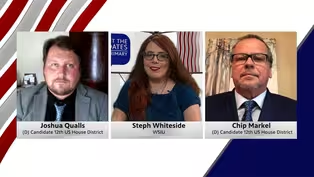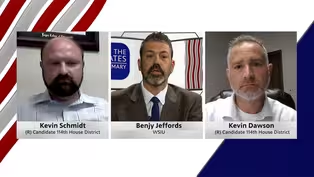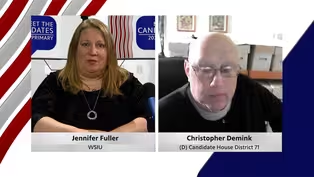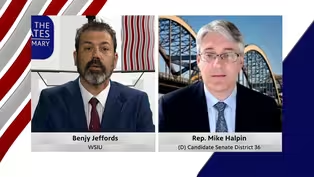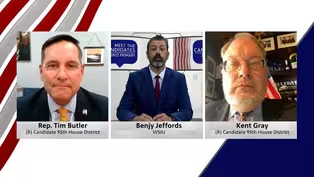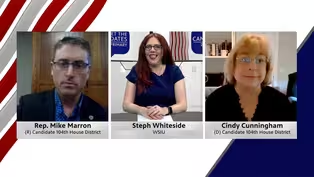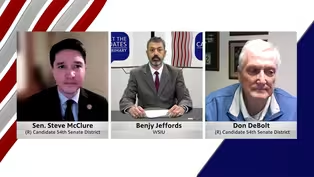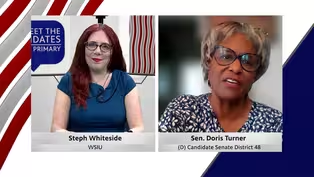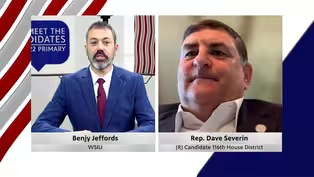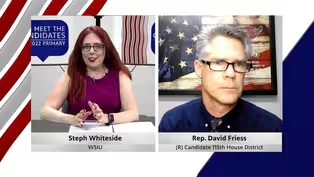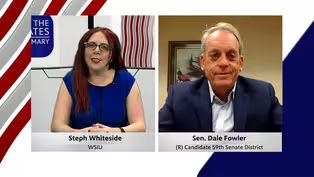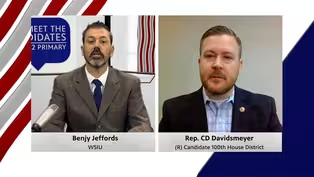Meet the Candidates
118th Illinois House District Primary Republican Candidates
4/14/2022 | 25m 9sVideo has Closed Captions
118th Illinois House District Primary Republican Candidates forum.
Meet the Candidates interviews candidates for the 118th District of the Illinois House, Representative Paul Jacobs (R) and Aaron Smith (R).
Problems playing video? | Closed Captioning Feedback
Problems playing video? | Closed Captioning Feedback
Meet the Candidates is a local public television program presented by WSIU
This series is produced in partnership with the League of Women Voters
Meet the Candidates
118th Illinois House District Primary Republican Candidates
4/14/2022 | 25m 9sVideo has Closed Captions
Meet the Candidates interviews candidates for the 118th District of the Illinois House, Representative Paul Jacobs (R) and Aaron Smith (R).
Problems playing video? | Closed Captioning Feedback
How to Watch Meet the Candidates
Meet the Candidates is available to stream on pbs.org and the free PBS App, available on iPhone, Apple TV, Android TV, Android smartphones, Amazon Fire TV, Amazon Fire Tablet, Roku, Samsung Smart TV, and Vizio.
Providing Support for PBS.org
Learn Moreabout PBS online sponsorshipMore from This Collection
Meet the Candidates features interviews with candidates running for Illinois state, House and Senate races. Guests will discuss key issues impacting Illinois voters such as the economy, the environment, education and public health. This series is produced in partnership with the League of Women Voters.
12th U.S. Congressional Seat Primary Candidate Forum
Video has Closed Captions
Joshua Qualls and Chip Markel, running for the 12th U.S. Congressional Seat. (25m 21s)
114th Illinois House District Primary Candidate Forum
Video has Closed Captions
Dr. Kevin Schmidt and Kevin Dawson, running for the 114th House District. (25m 57s)
71st House District Primary Candidate
Video has Closed Captions
Ahead of the June primary, WSIU talked with Christopher Demink, running for the 71st House (21m 35s)
36th Senate District Primary Candidate Forum
Video has Closed Captions
WSIU talked with 36th Senate District candidate Representative Mike Halpin. (26m 29s)
95th Illinois House District Primary Republican Candidates
Video has Closed Captions
Representative Tim Butler and Kent Gray, running for the 95th House District. (26m 58s)
104th Illinois House District Primary Candidates
Video has Closed Captions
104th House District candidates Representative (R) Mike Marron and (D) Cindy Cunningham. (26m 49s)
54th Illinois Senate District Primary Republican Candidates
Video has Closed Captions
54th Illinois Senate District Primary Republican Candidates forum. (25m)
48th Illinois Senate District Primary Democrat Candidates
Video has Closed Captions
48th Illinois Senate District Primary Democrat Candidates forum. (26m 46s)
116th Illinois House District Primary Republican Candidates
Video has Closed Captions
116th Illinois House District Primary Republican Candidates forum. (25m 9s)
115th Illinois House District Primary Republican Candidates
Video has Closed Captions
115th Illinois House District Primary Republican Candidates forum. (23m 14s)
59th Illinois Senate District Primary Republican Candidate
Video has Closed Captions
WSIU interviews Senator Dale Fowler from the 59th Senate District. (27m 29s)
100th Illinois House District Primary Republican Candidates
Video has Closed Captions
WSIU interviews candidate C.D. Davidsmeyer, running for the 100th House seat. (26m 9s)
Providing Support for PBS.org
Learn Moreabout PBS online sponsorship(upbeat music) (upbeat music) - This is "Meet the Candidates" with primary candidates for the 118th district.
I'm Steph Whiteside.
WSIU Public Broadcasting and the League of Women Voters are pleased to host today's forum.
The rules are simple.
Each candidate will have 60 seconds to answer the question and should not mention their opponent in their response.
Joining us today are Representatives Paul Jacobs and Aaron Smith.
Thank you so much for joining us.
Paul, we'll start with you.
What is your number one priority, if elected?
I know it can be hard to narrow it down, but please try to stick to just one.
- Well, since I have been elected, and I am the incumbent, I have a lot of priorities.
The biggest priorities in this district really come down to public safety throughout the state, but even more so here.
Second Amendment rights are very big here, and also even though coming to the south, is a little bit more liberal, leans more liberal, pro-abortion is not one of those big things.
Pro-life is what we really try to shoot for.
And of course, our favorite, tax cuts.
- All right, thank you, Paul.
Aaron?
- The biggest thing that we need to do in this district is retain our are people.
I have four young children, and in the coming years, they're gonna have to make a decision whether or not they're going to stay in Illinois and in this district.
And right now the trajectory of our state, we're bleeding people, and there are clear reasons for that.
We need people from our district to head to Springfield and push back against the high taxation, the anti-parent involvement problems that we have in our education system to keep our people right here.
- All right, thank you.
Aaron, we'll start with you this time: What would make you an effective lawmaker if elected?
- That's a good question.
My dad always told me not to confuse effort with results.
And so I implement that philosophy in my company and in my life.
And I believe that for a lot of years, we've had downstate legislators who have gone to Springfield and talked a lot about how hard they've fought against the super majority, but without a lot of results to be able to put on the table for Southern Illinoisans.
I believe my track record as a unifier on the John A. Logan College Board has shown that I can bring people together, and I want to be judged based on my results, not my effort.
- All right, thanks, Aaron.
Paul?
- Well, it's obviously a little bit tilted toward me because I sponsored or co-sponsored 150 bills in this legislation.
Of those, approximately 50 of my bills that are sponsored or co-sponsored were passed.
So, we do a lot.
I am bipartisan, I have many of the progressive side of the party are co-sponsors with me on the bills that we've passed.
We've passed catalytic converters, the theft of catalytic converters.
We've passed all of the telehealth, dental, optometry, medicine.
So it's not a case of what I will do, it's what I have been doing, and we need to continue.
Thank you.
- Thank you.
And for the next question, Paul: The pandemic really exposed disparities in education funding.
What would you do to make sure schools in your district are able to meet the needs of families and students?
- Well, I'm not sure the pandemic had much to do with disparities in the education funding.
What is having more trouble is the bills that were passed, the CEJA Bill with the green, moving straight ahead into absolutely closing every coal generation plant, every coal mine, and every generator that's a gas driven generation plant.
We have two schools in Southern Illinois, Galatia and Shawnee, that their whole tax base, $1.3-$1.4 million was taken away from them.
I personally got that put into the budget so that these people will have, they will have funding this year.
So, you know, there are things that happen and they only can do that when you know the Democrats and have Democrat friends.
So, you know, we're going to continue doing that.
You know, the disparity is there.
I think that it's going to, but before the pandemic, I think that you need to realize there are a lot of things that were going on before the pandemic to equalize the spending of the school.
- Well, thank you.
And Aaron, same question to you.
- Yeah, so as a product of a Southern Illinois High School, I got to see firsthand the disparity between my friends who I met at SIU and at John A. Logan, when I attended college there, the high schools that they had gone to in the Collar Counties, and this has been a problem for many, many years.
My parents were educators.
This has been a part of the dialogue in my house my entire life.
What we need to do is equalize how we distribute funding.
There are mechanisms to try and make it more balanced.
But during the pandemic, we would see Collar County schools that would have tremendous success, no problems with funding, while when the business here were shut down, when people ran onto unemployment, we had catastrophic consequences in our schools.
We have to work to equalize that funding so that a student in a school here in the 118th district is on the same footing as a student who is in a school in Cook County.
- Thank you.
And we'll start with you again, Aaron.
The state budget is a major priority in Springfield.
Name three things you would prioritize.
- Well, interestingly, right now we're not entirely sure, folks like me, what's in it because of the multi thousand page budget drop that happened at the end of last week from the opposition party.
But here's what I will tell you.
We always have to prioritize law enforcement, education, and our pension systems.
Our law enforcement, nothing else matters if we're not safe.
If our law enforce men and women are not supported by our budget, everything else falls apart.
Second comes education.
We obviously are heavy on education in this district.
We have a couple of community colleges.
We have a major university in the state of Illinois.
So it matters to us, but it matters to everyone for the health of Illinois, for the future of Illinois, how we invest in education.
And then lastly, our pension funds that have to be supported by our budget.
- Thank you, Paul?
- Pretty much the pension funds are probably the most important and they've been completely ignored.
Again, the Safety Bill was passed, which was called the police bill in previous months.
It's absolutely a sham.
It needs to be, I have a bill to repeal that bill.
That didn't happen, but in the budget, they did allow for some increase in police funding.
They took the funding, all you heard last year was defund, defund, defund.
Well, that was an absolute horrendous mistake.
And of course the pensions, you have to protect the people that are retired.
They have worked for that pension in a particular way.
That's the most important thing.
Then you utilize 401ks and any other things that you can use.
Buyouts have been suggested, and it may end up being a pretty good way of doing things.
A third thing is always tax cuts.
There are ways to cut taxes and we have actually cut some taxes in one bill, in Friday nights' fit.
- All right, well, thank you.
And now that we've talked about budget priorities, the next question for you, Paul, is what are three things that you would cut?
- Three things that we would cut?
It's not one single three thing.
What you have to do is have across the board, every agency cut a small percentage, and you could do that over time, you could do it over 10 or 15 years.
But most importantly, you have to quit making new programs.
Old programs can end up being funded, but you can't make a new program because your district needs this.
You have a, you know, we're 118 districts, and you can't just continue, as the Democrats have done, it's taken almost $2 billion on pork funding in this budget.
And that's why you didn't see one Republican vote for the budget.
It's not that we don't have things in the budget that we want to get through.
It's just, you can't continue to just do pork.
And you know what, every agency can cut some, and that's what it's gonna have to do until you can build the population back up.
Williamson County has lost people the same as everybody else in this last year, 2021, 400,000.
Every district, every county has lost a few hundred.
- All right, yes, thank you.
And Aaron, same question to you.
- So as far as what I would cut, when you look at our state, when you look at our agencies, if you did a deep dive into it, you would see redundancies all over the place.
While I agree that, as a general rule, it's nice to look at agencies and say, reduce everything by X amount.
That might not work in some agencies.
The state police, for example, don't know, given our current climate, that it's fair to look at them when I'm arguing that we potentially increase funding there, and say, You with everyone else.
But I think we can target specific agencies with overlap either within the agency or interagency issues and find very clear places where we are paying multiple people to do one job.
And if we can clean that up, I think that's a very good place to start.
- All right, well, thank you.
And for the next question, Aaron, we'll move on to some recent events.
Although the economy is recovering from the early stages of the pandemic, inflation is also on the rise.
What would you do to help Illinoisans who are finding that their paychecks don't stretch as far as they did even a couple of months ago?
- It's a good question and it's got a lot of implications to it.
First and foremost, we have to reduce the tax burden on our people.
When we run payroll at my company, I see every time there's a tax increase, how that impacts the checks that are going out to my people.
So reducing the taxes is an excellent place to start.
With the inflation that we've seen, I would love to see us bring new, good jobs into this district.
I think that the port in Cairo is gonna be important for that.
The most important thing we can do is provide good career jobs for the people who live in this district.
We can also balance that with tax cuts, this district will thrive.
- Thank you, Paul?
- You've got to stop the exodus of the people from the state and the right way to do that is the exact opposite, as my opponent has said, let's cut taxes, but then he says, let's go ahead and increase spending.
You can't do both.
You've gotta do one or the other, or you can do both together on all agencies.
But the biggest thing I think that we have to do is create careers.
I'm not so much concerned that we can't.
I think that we can if we keep the kids that are, 51% of our children go out of the state to go to college.
I think that the local colleges now with the new chancellor, they're going after local people to stay in this, and go to school here.
As you get people to stay here, they are going to get careers here and they're going to bring other businesses here.
Cairo Port is extremely important.
We can go over that for hours.
Thank you.
- Thank you.
Paul, many people are pushing for more renewable energy, especially with the rising price of oil.
At the same time, parts of Illinois have fossil fuel supplies that could provide energy for many years to come.
What would you do to ensure Illinois has a steady supply of energy and keep it affordable for Illinoisans?
- Well, number one, you have a group of people that is trying to make sure that we just kill the coal and kill the gas, and it's happening.
As I mentioned earlier, we have two school districts that are going to close and it's gonna happen throughout the state.
We have to work with, from an all energy perspective.
You can't just do, we're getting rid of coal, we're getting rid of that.
Actually, there are many Democrats that are starting to express the same view that we can't do this.
Set some logical time, 2050, later.
Right now, all the coal mines are shutting down by 2028, five years, five years, and that's a lot of jobs we're going to lose.
You can still do other forms with solar and with wind machines.
There are tons of things that are happening, hydrogen's coming off.
So if we can just use all of what we have, we're gonna have to continue with coal, but nobody's gonna come here for that.
- What would you do to ensure Illinois has a steady supply of energy and keep it affordable for Illinoisans?
- I can answer that very simply and say, deregulate coal.
That's a driver of the economy that I was born into.
When I was young in this area, I remember friends who had parents who were laid off from coal mines who were offered jobs in other states, and then they could mine coal there and then ship it back into our state, which was absurd then, and is absurd now.
There's a trickle down effect of jobs that would come with that.
I know it might not be the, it's not the be all, end all answer.
I'm for exploring anything that works better, but where we stand right now, what we know about cold and with the resources we have under the ground right here, deregulate coal.
- All right, thank you.
And for you again, Aaron, COVID-19 really changed the way people look at healthcare and public health.
What would you do to make sure Illinois is prepared to handle future public health emergencies?
- Well, this pandemic certainly displayed a lot of flaws in our current system.
The most important thing is we have to prevent one person from being able to shut down our entire state.
I believe there was a loophole in the system that allowed our governor to create successive emergency authorization acts instead of just having one, and then having representatives from every community in our state, namely our legislators, weigh in on this.
Instead we had one person at the top.
That has to change, and that allows for more local control, which would put us would've put us far better off a year ago and will us better off in the future.
- All right, thanks, Aaron.
Paul?
- Well, number one, I'm the only physician of any type in the state legislature, so it was up to me to form a number of different things with telehealth.
As I did mention earlier, telehealth for dentistry, for medicine, and for optometry was extremely, it was extremely needed.
When I first had to go out of the office two years ago, I was sitting there going well, you know, I have patients that have hemorrhages, that have retinal hemorrhages, that have problems that I, can't not be essential.
I have to go back in.
So as I went back in, we saw that there were a number of things in the pandemic that had to be fixed, so we did that.
I don't know how anybody is going to go against the super majority and change those laws to make the governor do what he should have done in the first place and let the state legislatures run the operation.
It must come up exactly the same, if that's okay.
at least the equal branch of government, the state house, the state legislature, and the state senate could have been involved.
Thank you.
- Thank you.
Paul, gun violence continues to be a problem for communities across the state.
What would you do to address the violence and how do you balance that with second amendment rights?
- But gun violence, you know, the people that legally own weapons are not the people that are going out and shooting, and the weapons that are registered are not the ones that are used.
It's illegal guns.
If you continue to defund the police and make it impossible for them to go into the areas where the guns are being brought in illegally, you are going to continue to get this increase of carjackings.
I mean, these carjackings are happening all over the state.
It's not just in Chicago.
The gun control itself is not going to be an answer.
If you have people buying illegal guns, and that are illegal, and kids out of areas that are continuing to have high crime, and they continue high crime, and you're not helping them with education and careers and other things to get them out of that situation, it's gonna continue.
It has pretty much nothing to do with weapons.
That's all I have to say on that.
Thank you.
- Thanks, Paul.
Aaron?
- We need to enforce, rather, Cook County needs to enforce the laws that are already on the books.
We don't have a deficit in laws regarding guns.
We have a deficit in those communities policing themselves and being policed.
I am a strong supporter of the second amendment.
I don't believe the FOID cards should even exist, and I do not believe that the problem in this state is legal gun owners.
And the more laws that we put against them, it's not gonna help crime.
We need to enforce the laws on the book and we need to protect the right of every law abiding citizen to keep and bear arms.
- Thank you.
Aaron, criminal justice reform is a hot topic in Springfield.
Do you support changes to the system, including alternative sentencing options like drug courts?
What changes would you make to ensure safety while also making sure rehabilitation remains an option?
- That's another really good question, and I love that our county, I live in Williamson County, has a very, very effective drug court that has seen a lot of positive results.
But first and foremost, we have to be safe and I would always prioritize our people being safe over rehabilitation.
There has to be a starting point, and that is that the bad guys wind up away from people.
I think that we should have every opportunity for rehabilitation, but it has to start with the criminals in our society being kept away from our law abiding citizens.
So that's priority one for me when it comes to that.
And that secondly, the so-called Safety Act that was passed a year ago was a catastrophe, and anybody in law enforcement would affirm that, and so I would also support any effort to repeal that in its entirety.
- Thank you.
Paul?
- I think you maybe speaking about the marijuana charges before and re-sentencing, et cetera, and that can be done through, it has to be done through the state's attorney in the jurisdiction that the person was sentenced, and that's gonna be pretty difficult for them to do.
So, you know, it was a little bit of a thing they gave, but it's not that good of a thing they gave.
The Safety Act was obviously the biggest problem in trying to let people out.
You have state's attorneys in Cook County, that the state attorney in Cook County, that they release everybody, they're just releasing everybody, and it's unfortunate.
But you have a better chance of trying to control this if you do have your police funded fully.
There's no other way to get around it.
You've got to get the people put into the prison, do their time, and if it comes that they have been rehabilitated, that's great.
I was at Murphysboro at the center there, and they're teaching welding.
The recidivism has gone down to 80% on these kids that are coming out with good careers, and you can do that in the prison.
Get them through that, through a good career path.
- Thank you.
And for you again, Paul, recent events have shown how much Americans can be impacted by global politics as evidenced by supply chain shortages and rising prices due to the pandemic and fighting in Ukraine.
What would you do to try to help minimize the disruption of events like the, on the people of Illinois?
- Hey, make it in America, buy it in America, do everything in America.
Then you don't have the supply chain sitting off on a shipping container on in California or any other port.
But that being said, you still have to have, you have to have relationships with other nations.
There's no way to get around it.
The pandemic itself set up people that are working from home, people that are getting paid to stay at home, or having a difficult time getting people to come back to work.
So you're going to have a supply chain problem, even within the United States, because of the giveaway attitude that we're doing.
$3 trillion, it's more than that, $3 trillion-plus, that our families are going to pay for, our grandchildren, our great-grandchildren, and probably their great-grandchildren.
This was a big mistake that they did, and it's gonna continue to be a mistake as long as the government keeps them meddling in it.
It will never get a good supply chain until they get 'em out and do free market.
- Thank you, Aaron?
- It's a good example of how we need a lawmaker in office who can work with the federal and local governments, because our supply chain issues, they hit all three.
And so our federal government, our federal representatives and senators all the way down to our local folks who are overseeing manufacturing, we need people who can go in and play our role to facilitate the right things coming into our state.
So if elected, I will work in that big picture environment that involves federal, state, and local to do our part in Illinois to make sure that supply chain issues to own impact us again like they have in the last year.
- Thank you.
And this is going to be our last question.
So for you again, what would you do to make sure the concerns of your constituents are heard in Springfield considering the population density skews toward the Northern part of the state?
- Well, each representative represents an almost equal amount of people.
Currently as the vice chair of the John A. Logan College Board, our district spans actually a little bit more than a typical representative district.
So I've spent the last three years of my life responding to the concerns of people from a similar geographic area.
Similarly, I grew up here.
I've lived life here, and so the constituents are not people that are numbers for me.
They're people that I went to high school with.
They're people who I've worked with, who I've gone to church with, who our kids have played baseball together.
And so for me, my fingers reach into each of these areas of the district in a unique way and I look forward to being able to serve them directly.
- Thank you, and Paul, for you.
- Well, it's fairly simple.
I have practiced longer than my opponent's been alive in all four, in all of these counties.
So as far as business experience and life experience, I enjoy it, I love it, and I'm in the middle of doing it as much as we possibly can.
The people need to be represented with a definite representative that has been there, has done it, and pretty much that's my record.
My record is very simple to check at ilga.gov.
And you can see every bill, every bill that we voted for, every bill that we voted against, that's my record.
And, you know, we need to go back, we need to go back to continue the work that we've done.
You know, the seats are going to be won.
We're going to have additional seats.
And when those seats are won, we need to have, continue with a trusted, proven, consistent, conservative, and that's where we'll end.
Thank you.
- Well, thank you both so much for joining us for Meet the Candidates for the house district 118 with candidates, Representative Paul Jacobs and Aaron Smith.
Tune in next Thursday at 7:00 PM as we speak with the candidates from Senate districts 58 and 59.
For WSIU, I'm Steph Whiteside.
(gentle upbeat music)

- News and Public Affairs

Top journalists deliver compelling original analysis of the hour's headlines.

- News and Public Affairs

FRONTLINE is investigative journalism that questions, explains and changes our world.












Support for PBS provided by:
Meet the Candidates is a local public television program presented by WSIU
This series is produced in partnership with the League of Women Voters

